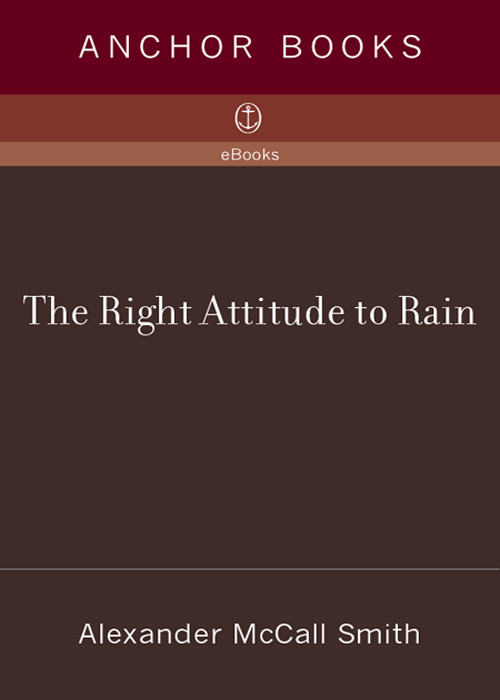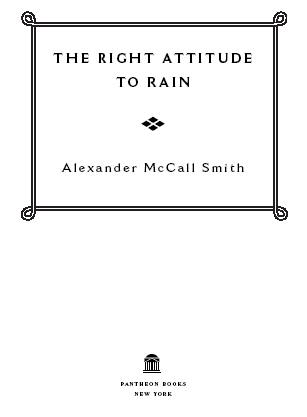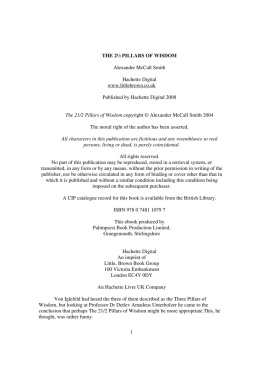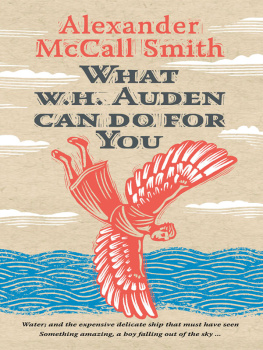Alexander McCall Smith - The Right Attitude to Rain
Here you can read online Alexander McCall Smith - The Right Attitude to Rain full text of the book (entire story) in english for free. Download pdf and epub, get meaning, cover and reviews about this ebook. year: 2006, publisher: Pantheon Books, genre: Prose. Description of the work, (preface) as well as reviews are available. Best literature library LitArk.com created for fans of good reading and offers a wide selection of genres:
Romance novel
Science fiction
Adventure
Detective
Science
History
Home and family
Prose
Art
Politics
Computer
Non-fiction
Religion
Business
Children
Humor
Choose a favorite category and find really read worthwhile books. Enjoy immersion in the world of imagination, feel the emotions of the characters or learn something new for yourself, make an fascinating discovery.

- Book:The Right Attitude to Rain
- Author:
- Publisher:Pantheon Books
- Genre:
- Year:2006
- Rating:5 / 5
- Favourites:Add to favourites
- Your mark:
- 100
- 1
- 2
- 3
- 4
- 5
The Right Attitude to Rain: summary, description and annotation
We offer to read an annotation, description, summary or preface (depends on what the author of the book "The Right Attitude to Rain" wrote himself). If you haven't found the necessary information about the book — write in the comments, we will try to find it.
Alexander McCall Smith: author's other books
Who wrote The Right Attitude to Rain? Find out the surname, the name of the author of the book and a list of all author's works by series.
The Right Attitude to Rain — read online for free the complete book (whole text) full work
Below is the text of the book, divided by pages. System saving the place of the last page read, allows you to conveniently read the book "The Right Attitude to Rain" online for free, without having to search again every time where you left off. Put a bookmark, and you can go to the page where you finished reading at any time.
Font size:
Interval:
Bookmark:


CONTENTS
This book is for Edward Mendelson
CHAPTER ONE

T O TAKE AN INTEREST in the affairs of others is entirely natural; so natural, in fact, that even a cat, lying cat-napping on top of a wall, will watch with half an eye the people walking by below. But between such curiosity, which is permissible, and nosiness, which is not, there lies a dividing line that some people simply misseven if it is a line that is painted red and marked by the very clearest of warning signs.
Isabel adjusted the position of her chair. She was sitting in the window of the Glass and Thompson caf at the top of Dundas Streetwhere it descended sharply down the hill to Canonmills. From that point in the street, one could see in the distance the hills of Fife beyond: dark-green hills in that light, but at times an attenuated blue, softened by the seaalways changing. Isabel liked this caf, where the display windows of the shop it had once been had now been made into sitting areas for customers. Edinburgh was normally too chilly to allow people to sit out while drinking their coffee, except for a few short weeks in the high summer when caf life spilled out onto the pavement, tentatively, as if expecting a rebuff from the elements. This was a compromiseto sit in the window, protected by glass, and yet feel part of what was going on outside.
She edged her chair forwards in order to see a little more of what was happening on the other side of the road, at a slight angle. Dundas Street was a street of galleries. Some were well established, such as the Scottish Gallery and the Open Eye, others were struggling to make a living on the work of young artists who still believed that great things lay ahead. Most of them would be disappointed, of course, as they discovered that the world did not share their conviction, but they tried nonetheless, and continued to try. One of these smaller galleries was hosting an opening and Isabel could see the crowd milling about within. At the front door stood a small knot of smokers, drawing on cigarettes, bound together in their exclusion. She strained to make out the features of one of them, a tall man wearing a blue jacket, who was talking animatedly to a woman beside him, gesturing to emphasise some private point. He looked vaguely familiar, she decided, but it was difficult to tell from that distance and angle. Suddenly the man in the blue jacket stopped gesturing, reached forward and rested a hand on the womans shoulder. She moved sideways, as if to shrug him off, but he held on tight. Her hand went up in what seemed to be an attempt to prise off his fingers, but all the time she was smilingIsabel could see that. Strange, she thought; an argument conducted in the language of smiles.
But more intriguing still: an expensive car, one of those discreet cars of uncertain make but with unambiguous presence, had drawn up on the caf side of the street, just below the level of Isabels window. It had stopped and a man and a woman had emerged. They were in a no-parking zone, and Isabel watched as the man pressed the device on his key ring that would lock the doors automatically. You are allowed to drop things off, thought Isabel, but not park. Dont you know that? And then she thought: People who drive cars like that consider themselves above the regulations, the rules that prevent those with humbler cars, and shallower pockets, from parking. And these people, of course, can afford the parking fines; small change for them. She found herself feeling irritated, and her irritation became, after a few moments, animosity. She found herself disliking them, this man and woman standing beside their expensive car, because of their arrogance.
She looked down into her coffee cup, and then up again. No, she thought. This is wrong. You should not dislike people you do not know. And she knew nothing about them, other than that they appeared to imagine that their wealth entitled them to ignore the regulations by which the rest of us had to abide. But then they might not know that one could not park there because they were from somewhere else; from a place where a double yellow line might be an invitation to park, for all she knew. And even as she thought this, she realised that of course they were not from Edinburgh. Their clothes were different, and their complexions too. These people had been in the sun somewhere, and their clothes had that cut, that freshly dry-cleaned look that Scottish clothes never seem to have. Scottish clothes are soft, a bit crumpled, lived-in, like Scottish people themselves really.
She craned her neck. The two of them, the man considerably older than the woman, were walking down the road, away from the car. They paused as the man pointed at a door, and the woman said something to him. Isabel saw her adjust the printed silk scarf around her neck and glance at the watch on her wrist, a small circle of gold that caught the sun as she moved her arm. The man nodded and they climbed the steps that led into the Scottish Gallery. Isabel sat back in her seat. It was not remarkable in any way; a wealthy couple from somewhere else, driving into town, leaving their car where they should notbut out of ignorance rather than arroganceand then going into one of the galleries. There was nothing particularly interesting about all that, except for one thing. Isabel had seen the mans face, which was drawn up on one side from Bells palsy, producing the conditions characteristic grimace. And the womans face had been, by contrast, a beautiful oneif ones standards of beauty are the regular features of the Renaissance Madonna: soft, composed, feminine.
They are none of my business, she thought. And yet she had nothing to do until twelve oclockit was then ten-thirty in the morningand she had been half thinking of going into the Scottish Gallery anyway. She knew the staff there, and they usually showed her something interesting by the Scottish artists she liked, a Peploe sketch, a Philipson nude, something by William Crosbie if she was in luck. If she went in now, she would see the couple at closer quarters and reach a more considered view. She had been wrong to dislike them, and she owed it to them now to find out a little bit more about them. So it was not pure curiosity, even if it looked like it; this was really an exercise in rectifying a mistaken judgement.
THE ENTRANCE TO the Scottish Gallery was a glass door, behind which a short set of open stairs led to the upper gallery, while a slightly longer set led down into a warren of basement exhibition spaces. These lower spaces were not dark, as basements could be, but brightly lit by strategically placed display lights, and brightened, too, by the splashes of colour on the walls. Isabel went up and passed the desk of her friend Robin McClure to her right. He sat there with his list of prices and his catalogues, ready to answer questions. What impressed her about Robin was that although he could tell who bought paintings and who did not, he was civil to both. So those who wandered into the gallery because it was wet outside, or because they just wanted to look at art, would receive from him as courteous a welcome as those who wandered in with the intention of buying a painting or, in the case of those who were weaker, a readiness to be tempted to buy. That, thought Isabel, was what distinguished Dundas Street galleries from many of the expensive galleries in London and Paris, where bells had to be rung before the door was opened. And even then, once the door had been unlocked, the welcome, if it was a welcome, was grudging and suspicious.
Next pageFont size:
Interval:
Bookmark:
Similar books «The Right Attitude to Rain»
Look at similar books to The Right Attitude to Rain. We have selected literature similar in name and meaning in the hope of providing readers with more options to find new, interesting, not yet read works.
Discussion, reviews of the book The Right Attitude to Rain and just readers' own opinions. Leave your comments, write what you think about the work, its meaning or the main characters. Specify what exactly you liked and what you didn't like, and why you think so.









